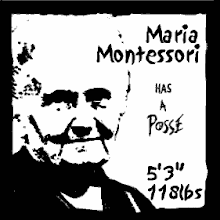the confident teacher
Really, now. What does it take to become a confident teacher?
I feel so unconfident, so often, that I feel like I'll never, ever proclaim, "I know exactly what to do!!" when faced with some kind of classroom/child meltdown. Hopefully, Montessori teaching will mean fewer meltdowns since there are fewer restrictions on activity, but Primary classrooms are still full of tantrum-containing little ones.
I was just talking with a teacher from my old school who has a few of my students from last year. A few of the difficult ones. That got more difficult as last year wore on.
And I feel...guilty. Like, maybe the way I and my co-teacher handled the end of the year made behavior problems worsen and stay poor in the current school year. Maybe we got too unstructured. Maybe we should have planned more...something. Because it's hard to disassociate from the behavior of the child, even though my experiences with Montessori were what taught me to start attempting that pulling back in the first place.
ARGH.
I wonder when these feelings stop? I know that training in the Montessori method is making me so much more confident than I've ever felt about being in the classroom. There is a real and beautiful power about knowing you can approach a single child in the sea of many and ask, "Can I show you a lesson?" and you've got the key to this whole matrix of understanding that will start unfolding.
I really, really want to work in a Montessori school. Last year, I was on the fence, and I managed to get myself in the not teaching job that I've got at the moment. Now, I've got some knowledge. This is so important to me. I am really going to do it. I don't want to over think, but I need to write a great cover letter that shows my passion and experience in some concise way. (If you are reading this blog, you know I am not so concise, at times...) I need to stop feeling guilty about passing around my references and asking for letters of rec, because that's just part of teaching, and folks understand that, now don't they. And, I've got to do some practice interviews. I really don't even know how to approppriately express my excitement about Montessori because I don't think my voice has enough variety in tone and pitch.
All I know is I will give it my best (and do some nice writing activities to get all my passion into speakable sentance form. )
YAY! HAPPY!


